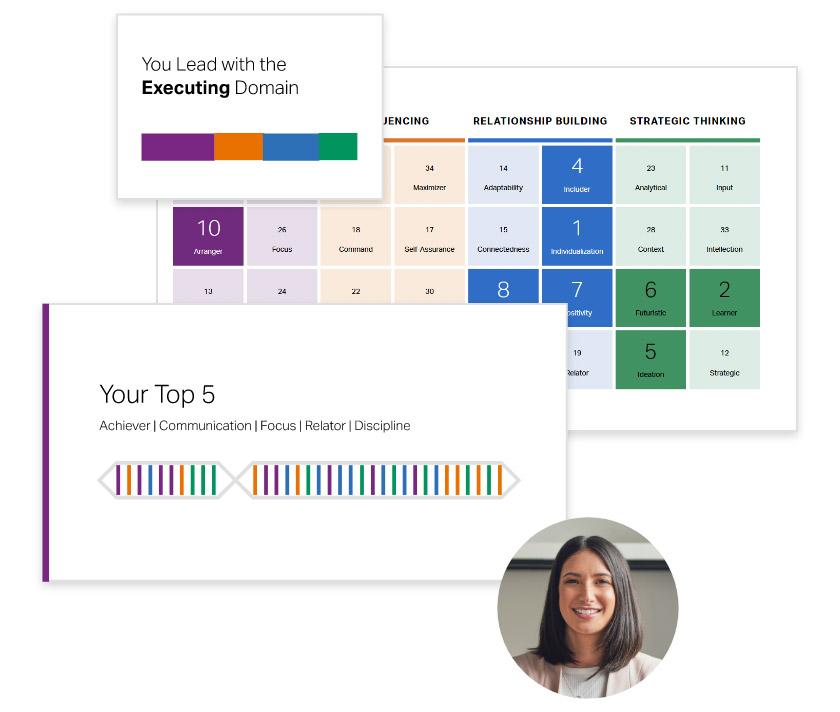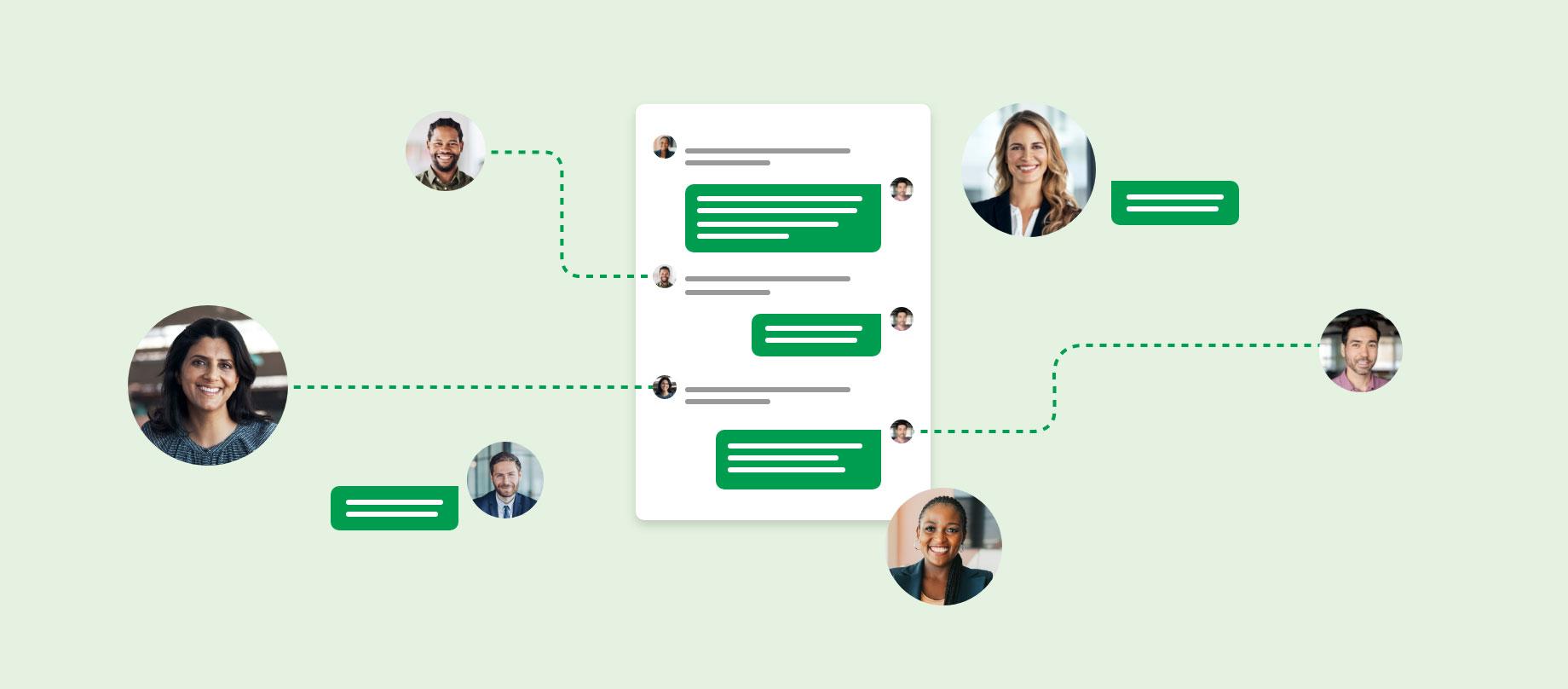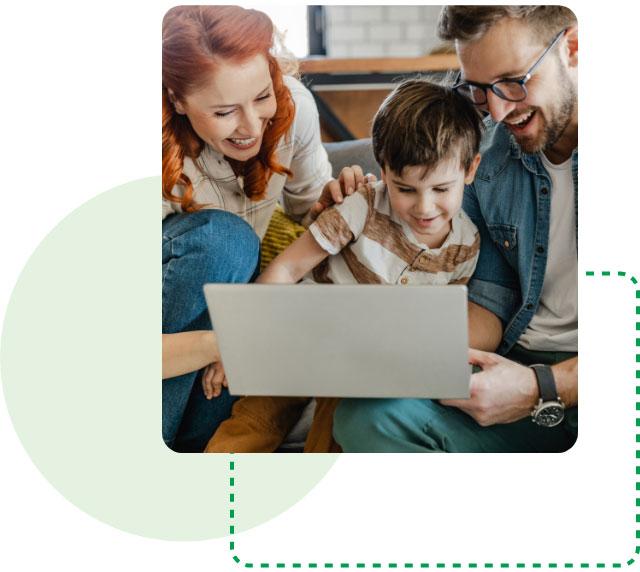Strengths Conversations
Get Started

If we're being honest, we all have room to improve the way we communicate with one another. CliftonStrengths, the talent assessment that helps people discover what they naturally do best, can provide the basis for better communication and more meaningful conversations.
How? Strengths helps people better understand themselves and others and provides a common language based on what is good about each person -- how we experience life, what drives us and the way we get things done. This positive reinforcement helps build understanding and trust between individuals and groups.
Having intentional conversations that involve strengths is an important way to build relationships, navigate conflict, grow personally and professionally, and accomplish more.
Why Conversations About Strengths Matter
- Strengths is an accelerant for conversations, creating simple ways to convey what you offer, what you need and how you can show up for others. It's a way to eliminate pretense and get to the heart of what's really important.
- It gives people a shortcut for getting to know each other and building trusting relationships. Strengths fosters productive ongoing conversations about what talents people bring to certain situations and is a language that bridges culture and organizational demographics -- giving team members ways to communicate why they are unique and how their differences benefit the team.
- Communication breaks down most often when we fail to understand each other or lack the self-awareness to understand how we fit in. CliftonStrengths enhances our self-awareness, gives us the language to easily articulate our commonalities and differences, and highlights how we and others contribute to the bigger picture.
- When we infuse strengths into our conversations, we're creating conditions for successful communication.

Powerful Partnerships
Think about a great partnership you've had. What was great about it?

Powerful partnerships are formed when two people use their unique strengths together to achieve more than they might have achieved alone. Maybe you've experienced a powerful partnership when working with someone whose strengths seem to supplement the things you naturally do well. Did the partnership amplify similar strengths or combine disparate strengths?
Strengths helps us articulate what we bring to the table and what we need from working relationships. It can eliminate the frustrations that arise when we don't understand where someone is coming from or what they do best. One of the most powerful reasons for teaming up is working with someone who is strong where you are weak, and vice versa.
When we have conversations about our strengths with the people we work with, in any context, we are laying the groundwork for powerful partnerships.
These questions can help spur conversations that enable great collaboration:
- How are our strengths similar, and what does this mean for our partnership?
- What unique strengths do we each bring to our partnership, and how do these add value?
- What do we need from each other in order to be great partners and to benefit our priorities?
- What misconceptions might we have about each other's talents that could inhibit our success as partners?
Communicating Strengths in a Partnership
Healthy partnerships include a certain amount of give and take. Your strengths help you articulate what you bring to a partnership and what you need from a partnership in order to be successful.
Think about how your strengths manifest themselves in the way you get things done.
If you have Activator in your top five, you probably are great at spearheading new projects. You bring the energy and coordination needed to get the ball rolling.
Communicate with your partner that you are happy to be the catalyst for starting new projects or initiatives.
Your high Activator might also mean that you need more action-oriented feedback and instruction from your partner. When you have tangible actions to accomplish, you operate better and get things done with less confusion.
Communicate with your partner that you need actionable feedback and input to do what you do best.
Take a look at these two individuals' strengths and what they mean within the context of a powerful partnership.
Understand what you bring to the partnership

- 1. Competition Winning
- 2. Communication Advocacy
- 3. Context History
- 4. Activator Catalyst
- 5. Achiever Drive
- 6. Futuristic Vision
- 7. Harmony Alignment
- 8. Significance Legacy
- 9. Focus Goals
- 10. Analytical Logic

- 1. Harmony Alignment
- 2. Arranger Orchestration
- 3. Maximizer Excellence
- 4. Relator Transparency
- 5. Input Resources
- 6. Includer Connection
- 7. Analytical Logic
- 8. Positivity Optimism
- 9. Intellection Reflection
- 10. Consistency Fairness

Career Conversations
Some of the most important conversations we have in our lives happen at work. Have better career conversations using strengths.
Job Interviews

Job Interviews
We've all had to answer this age-old (and sometimes arduous) interview question: What are your strengths and weaknesses? But if you know your strengths, this question can be an exciting prompt to talk about your unique talents and how you naturally excel.
How to think about your strengths when preparing for an interview:
- Read your strengths report, paying special attention to the words or phrases that resonate with you in the descriptions of your top strengths.
- Identify three ways you will showcase your strengths.
- Identify how you use your strengths to mitigate your weaknesses.
- Be prepared to tell your story -- prepare three stories about past experiences that demonstrate your strengths in action.
Job Interviews
- Connect your strengths to the role. Describe how your strengths would help you with the day-to-day requirements and demands of the role.
- Own your strengths. Be confident -- aim to "self-brand" yourself by showing your authentic talents and strengths.
- Acknowledge your weaknesses. They won't ever become strengths, but recognizing and taking responsibility for your weaknesses shows self-awareness.
Clearly communicating what you're good at (and not good at) in an interview gives you a better chance of standing out -- and landing the job. Strengths gives you descriptors to express exactly how you'll show up for a potential employer. Instead of vague or generic responses like, "I'm a hard worker," or, "I am a people person," you can reply with memorable and unique responses like, "I gain energy and give others energy as I accomplish things," or, "My high communication and relationship-building skills help me work well in groups or teams."
Performance Reviews and Feedback

Performance Reviews and Feedback
Performance reviews and feedback sessions are opportunities to highlight your growth, reflect on how your strengths showed up and look ahead to what you want to accomplish in the future. Your strengths will help you articulate what you've achieved and the unique way you did it.
Consider these ways to highlight your strengths during a performance review or feedback session:
- Think about your biggest accomplishments and how strengths helped you achieve them.
- Reflect on how strengths helped you during challenging or uncertain times.
- Consider how your strengths contribute to your team's success.
- Connect strengths with how you've developed in your role.
- Articulate how you plan to use your strengths to help you accomplish a goal you are working toward.
Developmental Conversations

Developmental Conversations
It's normal for humans to seek continuous growth. We all want to be better at what we do -- and we're most successful when we pick a developmental goal that's fueled by our existing capabilities.
Weaknesses will never become strengths -- but strengths develop infinitely. Which means that our conversations about professional development should be centered around strengths.
If you're seeking professional development, share your CliftonStrengths themes with your leader, manager or adviser. Discuss your talents and strengths and how you can find more ways to do what you do best. Ask these questions:
- Which of my top themes have you seen show up on a project or initiative I worked on?
- Have you observed any of my themes in action today?
- Are there any blinds spots I may be missing where my strengths are holding me back?
- How would you like to see me use my strengths on future projects or in a team context?
Managers
Strengths-based development helps your people become more confident, productive and self-aware. It also leads to higher engagement, better performance and lower attrition.
And yet, just 16% of employees say their last conversation with their manager was extremely meaningful. Gallup has found that just one meaningful conversation with each employee per week develops high-performance relationships more than any other leadership activity.
In addition to yearly or biannual performance reviews, managers should be communicating with each employee regularly through these types of conversations:

Quick Connects Quick Connects help employees stay connected and build relationships. They are not working meetings -- they're opportunities to touch base about how employees are doing, how they're using their strengths and what they're excited about. For managers, Quick Connects show that you care, you're interested in employees as people and you're available.
To focus on strengths in a Quick Connect, consider asking a question like, "What is something you are working on this week that is playing to your strengths?"

Check-Ins Check-Ins should happen at least once per month. They are working meetings about progress and priorities. These 30- to 60-minute conversations are an opportunity to review progress, address obstacles and identify where employees need support.
To focus on strengths in a Check-In, consider asking a question like, "Tell me about a recent success you had and how you used your strengths."

Developmental Coaching Developmental Coaching conversations focus on immediate feedback, relevant advice and proactive coaching -- in the moment. These employee-focused conversations allow managers to provide individualized strengths-based coaching when it matters most and offer tailored direction, support and advice to improve real-time performance.
To focus on strengths during Developmental Coaching, consider asking a question like, "As you focus on your development and growth, how will your strengths help or hinder you?"
Mentors
Mentors propel talent by sharing their knowledge and providing guidance and support to a less-experienced individual. Anyone who has support and advice to share can provide effective mentorship, regardless of their role or tenure.
Employees with a mentor are more than twice as likely as those without to strongly agree that their organization provides a clear plan for their career development.
Mentors should follow a similar approach to managers, having Quick Connects and Check-Ins in addition to setting aside time for bigger strengths development conversations. To become an even more effective mentor, manager or leader, become a Gallup-Certified Strengths Coach and help people accomplish great things by doing what they naturally do best.

Team Conversations
Research has consistently highlighted the importance of strong team relationships in the workplace: Employees with strong interpersonal relationships are significantly more productive and more likely to drive innovation.
Strengths-based teams understand and value each person's unique contribution. Forget all of the greater-than-the-sum-of-its-parts motivational sayings. Instead, focus on why it is imperative to know and support each individual's contributions to the team.

Gallup finds that the most engaged and productive teams have three things in common:
- They share a common mission and purpose.
- Collectively, they understand and appreciate each team member's CliftonStrengths profiles.
- They intentionally use each team member's CliftonStrengths.
So, how do you create engaged, productive teams? Through strengths conversations.
Teams/Colleagues

Teams/Colleagues
There is no more effective way to empower a team than for the team to see each other in terms of their strengths. The very best teams are aware of their individual and collective strengths and celebrate them. Teams should communicate how they work best, what they need from others to succeed, and what successful partnerships feel and look like.
Leaders and team members alike should ask these questions:
- What are the most pressing issues facing the team today?
- How can team members use their strengths to effectively address these issues?
All great teams have these qualities in common: 1. trust and communication, 2. appreciation and teamwork and 3. acceptance and forgiveness. Here are some questions we can ask to help build an even better team:
Trust and Communication
- How do we know we trust each other?
- How often and in what ways should we communicate?
- How could we do this better using our individual and collective strengths?
Appreciation and Teamwork
- How are our strengths complementary?
- How can we recognize each other's accomplishments?
- How could we do this better using our individual and collective strengths?
Acceptance and Forgiveness
- How are we different? How can we make these differences an advantage for our team?
- How can we forgive each other if we make a mistake?
- How could we do this better using our individual and collective strengths?
Managers

Managers
Managers who are looking to foster more cohesive and collaborative teams need to put strengths at the center of their team activities and discussions. Managers account for 70% of the variance in team engagement -- they are the catalyst for great teamwork.
To help team members understand and use their strengths, managers should ask themselves two questions: Am I an expert on my team members' strengths? Do all of my team members know and appreciate their unique strengths and contributions?
This means knowing individual employees' strengths and your team's collective strengths and using strengths-based conversations to help set and manage expectations related to goals and performance.
Help your team members know each other's strengths with collective conversation prompts during weekly or monthly team meetings:
- What strengths did you rely on most in the past week?
- What strengths of others did you notice on display recently?
- Talk about how you used a specific strength to accomplish a goal in the past month.
- What strengths of others do you need in order to do great work?
- What strength would you like to use more, and how can others help?
Over time, start asking more group-focused questions to recognize and encourage successful strengths collaboration:
- What are some examples of how someone else's strengths helped you achieve something?
- What collective strengths has the team used together over the past month?
- What strengths collaboration would you like to experience again?
- How did you feel like you used your strengths this week to show up for the team?
All great teams have these qualities in common: 1. trust and communication, 2. appreciation and teamwork and 3. acceptance and forgiveness. Here are some questions we can ask to help build an even better team:
Trust and Communication
- How do we know we trust each other?
- How often and in what ways should we communicate?
- How could we do this better using our individual and collective strengths?
Appreciation and Teamwork
- How are our strengths complementary?
- How can we recognize each other's accomplishments?
- How could we do this better using our individual and collective strengths?
Acceptance and Forgiveness
- How are we different? How can we make these differences an advantage for our team?
- How can we forgive each other if we make a mistake?
- How could we do this better using our individual and collective strengths?
Leaders

Leaders
Leaders are responsible for manager development. They should empower managers to coach employees using their own unique strengths.
Strengths-focused manager development conversations provide an example to managers. These conversations show them the kind of strengths development they should be administering to their team -- including sharing their strengths with their team to help team members know how to work better with them.
People perform at their best when they tap into their natural strengths and talents. Not everyone has the same management style. When managers can bring their full selves to testing new behaviors, they are more likely to remember those behaviors and more likely to use them.
Here are some questions leaders should ask their managers about strengths and developing teamwork:
- How are you using your strengths to show up for your team every day?
- Is there something getting in the way of your strengths? How can I help clear those obstacles?
- Tell me about the composition of your team's strengths. How do you plan on maximizing their strengths?
- How are you working to develop your team's strengths?
Remember, managers are essential to the development of highly engaged teams. When you help them maximize their strengths, you're helping them lead better teams.

Family and Friends
Even before your family member or friend took their strengths assessment, you probably were familiar with their unique talents. Strengths helps us grow in relationships with the people we love by deepening our understanding of them and giving us the tools to better navigate our lives together. It helps us listen better and ask better questions.

Strengths creates an outward focus and the ability to assume positive intent. In close relationships, other people's choices affect us. Understanding the motivation and meaning behind people's actions helps us avoid conflict, extend grace and talk about how those decisions affect us.
Perhaps more than anything, our family and friends can be the most honest with us and help us continually develop our strengths -- and we can do the same for them.
Ask your family members or friends to answer the following questions to help you learn how they see you using your dominant themes:
- What was your initial reaction to my report?
- Which theme or themes do you see most in me? Can you give me an example?
- What do you see as my greatest strengths?
- Does anything about my report surprise you? Why?
Don't be afraid to revisit the topic of strengths over and over again with the people closest to you. Not only will it encourage deeper, more meaningful conversations, but it will also help you and them grow.
Parents
Just like great leaders, there's not a set of specific strengths that make a great parent. It's all about recognizing and nurturing the strengths of the people who look to you for leadership.
Parental strengths conversations need to start with spouses. Even if you are not new to parenting, it's important to think about your unique strengths and ask each other these questions periodically:

- How do our strengths work well together in how we raise our kids?
- Which of my strengths is most helpful to you, and how can I use it more intentionally?
- Are there any areas in which our strengths are at odds with each other?
- How do you notice my strengths making a positive impact on our kids?
- Are there any aspects of my strengths that are getting in the way of effective parenting?

Kids
How often do we as parents -- in the midst of everyday life -- focus on our children's uniqueness? How often do we think about nurturing their innate gifts, talents and strengths? How often do we stop to consider that focusing on our own strengths, as well as our children's, will make the most significant difference in the future?
Like all people, our children will do their best when they get to use their talents every day. Whether or not your children have taken the CliftonStrengths Explorer assessment shouldn't prevent you from nurturing their innate talents.
Talk with your kids about their strengths with questions like these:
- What's something that you've done that you are proud of?
- What things seem easy to you or that you can do over and over without getting bored?
- What do your friends or your teachers look to you for?
- What is something that you feel like you're great at?

Difficult Conversations
Nobody likes difficult conversations, but we've all had to have one with someone at some point -- and we probably will again in the future. Maybe it's a conversation with a friend about something they (or you) did that was hurtful, a talk with a coworker about an unsuccessful project, or a discussion about a sensitive topic with a group of people.
Whatever the setting, using strengths as a starting point can be helpful in navigating hard conversations. Starting with strengths reminds us of our shared humanity and highlights our unique perspectives and proclivities. We can alleviate tension, discomfort and anger when we take time to better understand each other.

Prepare for difficult conversations by reflecting on your own strengths:
- How will you use your strengths to achieve a resolution?
- Is there a blind spot clouding your view of the situation?
- How can you use your strengths differently next time?

Then, seek to understand the strengths of the other person or people. You may need to ask questions about their strengths before broaching the difficult topic. This is an important exercise because it demonstrates that you want to better understand them as a person and that you value their unique traits.

Finally, during difficult conversations, strengths can provide additional context behind the decisions we made, the reasons we feel the way we do and how we would like things to be in the future. Referring to your strengths gives others a glimpse into what makes you, you.
Keep the Conversation Going
Imagine building deeper relationships, learning how to work with people better, excelling in your career and feeling more confident in the way to converse with others. Strengths can be the catalyst for important conversations, helping us relate to each other more effectively.
Take time to think about how you'll use strengths conversations to help yourself and others succeed. If you haven't already, take the CliftonStrengths assessment to discover your unique strengths.